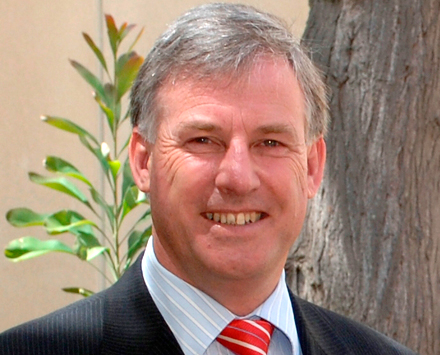
Senator Richard Colbeck
The Federal Government has foreshadowed a tough approach towards retailers who refuse to sell goods certified under the internationally recognised Australian Forestry Standard (AFS). Source: Philip Hopkins for Timberbiz
The Assistant Minister for Agriculture, Senator Richard Colbeck, said last week he was frustrated with some of the major retailers “who seem to think they can pick and choose between forestry standards”.
Senator Colbeck, who is responsible for forestry, was speaking during his opening address to the DANA Australian forest and wood products conference in Launceston.
“The Australian Government accepts the Australian Forestry Standard (now Responsible Wood, Australia) – we obviously had a part in the development of the AFS,” he said.
“I find it hard to accept that the Australian Government won’t be able to buy products that are certified under AFS with the attitude of some of the retailers.
“If they have that attitude, I might have a different attitude to them, so we are going to have to play the game pretty hard.”
Senator Colbeck did not mention any names, but last month Bunnings and Officeworks indicated they would only sell FSC (Forest Stewardship Council) products after 2020.
Senator Colbeck said there was strong acceptance of certification systems. Also, “work needs to be done in that space given the role of some environmental groups in relation to AFS”, he said.
“I’ll have conversations with them and FSC to ensure the market continues to accept AFS. That will be extremely important in the growth of the industry and role of the Australian sector.”
Senator Colbeck said acceptance of the value of timber and timber-based products in everyday lives, especially from native forests, was an important part of the industry’s social licence.
People understood the difference between house framing and beautiful wood products. A piece of blackwood, jarrah or blackbutt could not be found in a pine plantation.
“All those high-end products, beautiful floors we value, furniture and products we all value – the native forest plays an important part in the sector for that quality,” he said.
Tasmania’s concept of special species was an important part in winning the argument about using native forest. “People love those beautiful Tasmanian timbers that are only available through a native forest industry, they have a real emotional attachment,” he said.
“We all know for those who oppose the native industry, it’s not about science and fact, but emotion. We need to make our own emotional attachment with the broad community in partly the way we develop our social licence.
“We need to work on that message consistently because those who oppose this do exactly the same thing.”
Senator Colbeck said 87% of wood now came from plantations and that would continue, particularly for core products in construction.
“Native forest sector remains an important part of industry. People in the cities don’t understand the difference – they only know they have a timber-based product,” he said.
“Unless there is social licence for native forest, that will impact on social licence for the plantation sector.”
In this context, Senator Colbeck said the Government would continue working on the RFAs. The NSW RFA should be signed soon, while talks with Victoria were continuing. “Tasmania is already in place. That’s an important piece of work to maintain access to those resources we have,” he said.
“That continues to be ‘contentious’ in some areas. I use that word ‘contentious’ advisedly because that is the work that is now being used in the market to make life difficult for native forest products.
“I remain determined we maintain access to those resources. The responsibility for that lies more with the states and some are more difficult than others, but the Commonwealth can play a strong influencing role and I’m determined to do that.”
Senator Colbeck said the State Government had turned around the confidence of forestry in Tasmania, stimulating investment.
“The Hermal Group’s plans to create a CLT plant near Burnie is indicative of the mood,” he said.
In the context of the Federal Government’s $20 million, one-billion trees national forest plan, Senator Colbeck said consultation would soon begin about the regional forestry hubs around the country.
There would be local bids for recognition as industry hubs, as well as consideration of another couple of places for national innovation centres to complement those in South Australia and Tasmania.
Through greater co-ordination between these centres and Forest and Wood Products Australia, “we could generate something that looks like FP Innovations in Canada”. Developing a strong national innovation setting was a necessary target.
“We need to have this industry at the leading edge internationally in forestry. I don’t think we are there now – NZ and Canada are ahead of us – but the opportunity for us together is to make the investments that will drive innovations in the future,” he said.
Looking ahead, Senator Colbeck said the situation was bright, with strong demand forecast. “The role now is to get the resource in the ground,” he said.





